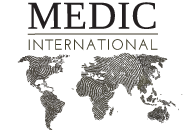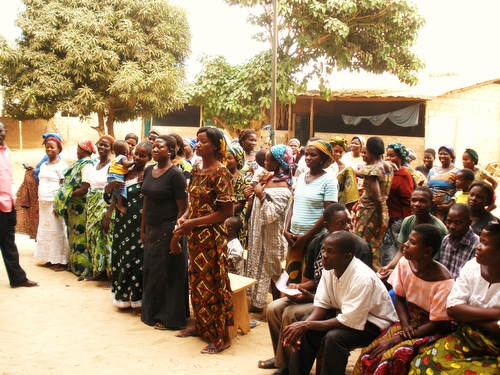
Group with ties to Barberton provides funds to micro-businesses
Written by By Paula Schleis for the Akron Beacon Journal business
Published: February 23, 2009
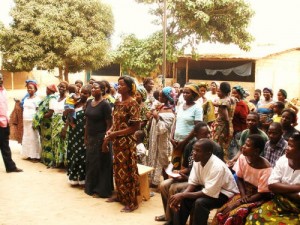
The dark eyes of the African widows revealed a story to Margie Roop.
She saw the chapters of yearning, the wish for a better life for themselves, their loved ones, their neighbors.Wordlessly, they spoke volumes on fatigue and depression, the daily scramble to feed and care for their families.
And then she saw hope as those eyes reflected a group of visitors to the tiny village in the West African nation of Togo.
Roop was in the company of Larry Lallo, who co-founded Mercy Economic Development International Corp. (MEDIC), a Christian-based mission that raises money to create ”trust banks” that loan money to third-world micro-businesses.
”We were greeted by them and their children with such wonderment and gratitude that I’ve never experienced in my life,” said Roop, president of the Barberton Rotary Club, which helped raise $50,000 to start the Togo trust banks.
Lallo and his small team arrived in Togo last month for the ceremony to award loans from $50 to $250 to 360 entrepreneurs in eight villages.
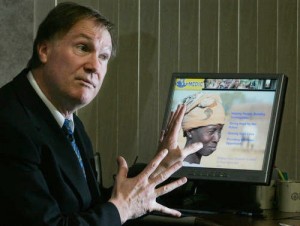 ”A little goes a long way there,” Lallo said.
”A little goes a long way there,” Lallo said.
The enterprises are mostly 1- or 2-person operations, repairing shoes, farming, selling beauty supplies, making clothes or prepared food or distributing charcoal and wood.
Most of the recipients are women, and most of the women are widows, Lallo said.
”The men rule. Most of them don’t work,” Lallo said. ”Women are expected to have children and make sure the children are taken care of.”
But it takes money to buy a sewing machine, or farming tools or inventory, and that’s where the trust banks come in.
Adapted from other successful micro-business financing programs, the MEDIC system gives people a hand up instead of a hand out, Lallo said, and the loan recipients know the difference.
”You see the significance in the smile on their faces,” he said. ”You see the value and respect they have for themselves. They are so full of thanks for what we’re doing and I almost feel bad. They’re the ones doing all the hard work.”
How it started
Lallo, who is also executive director of the Barberton Community Development Corp., created MEDIC in 2001 with David Daniels, a general contractor from East Canton, and Daniel Nallathamby, a Sri-Lankan refugee living in Canada. The men met through their missionary work.
From 1997-2002, Lallo helped on Mercy Ships, ocean vessels that provide health care to poor port communities around the world.
His experience taught him the value of sustainable activities — putting something into place that can continue after the missionaries move on.
MEDIC raised $20,000 to launch its first trust bank in Benin, another West African country. Soon after, it duplicated its program in nearby Ghana.
The group works with local officials and churches to create a board that can administer the money, determine eligible recipients and collect loan payments.
Lallo estimates it takes about $175,000 to make a trust bank fully sustainable, with a paid staff and enough cash flow to keep loans revolving.
So when Lallo met a woman from Togo who asked that MEDIC turn its attention to her country, the group had to decline.
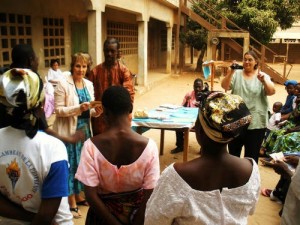
But in 2008, Benin met its threshold, and MEDIC was ready to cast a new net. Togo was waiting.
It didn’t take long to find a financial partner. As a new member of The Rotary Club of Barberton, Lallo learned about the group’s requirement to be involved in an international project.
The club had long raised funds for purchasing wheelchairs for impoverished areas, but Roop said the club’s 37 members were immediately and unanimously sold on Lallo’s crusade.
Over two years, the group raised $14,290. The Rotary Club’s district office and national office also chipped in, and MEDIC found itself with nearly $51,000, enough to launch trust banks in eight Togo villages.
How it works
MEDIC representatives on site in Benin spent six months last year showing their new Togo counterparts how to elect governing boards, train loan officers and run banks.
Hundreds of loan applications came in, and each bank settled on about 40 recipients.
A trust bank differs from a credit union in that the borrowers guarantee each other’s loans.
Members are put into groups of five, and they meet at least twice a month to discuss their experiences, share advice and motivate each other to succeed, Lallo said.
If one of the five business owners in a subgroup defaults, the other four must pay the loan back. If the entire group defaults, then all of the banks’ groups are responsible for the loan.
”That’s where ‘trust’ comes in,” Lallo said. ”They depend on each other” and that increases their sense of community and their chances for success.
”A lot of people come and think they see free money, then when they see the rules, you really separate the wheat from the chaff,” Lallo said. ”What’s left are those who are ready to work hard.”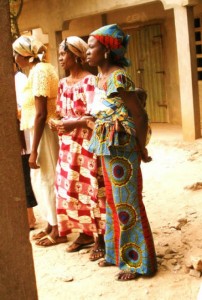
In Ghana, the payment rate of MEDIC’s trust banks is 100 percent. In Benin, it’s 98 percent.
MEDIC also runs workshops for the small business owners. Barberton Health Commissioner Paulette Kline joined the trip to conduct classes on basic health and safety for food preparers and Roop gave a seminar on organizing local business development meetings.
Business owners are also taught how to analyze their ideas, looking for ways to improve their plans or drop them in search of something with more potential, Lallo said.
”If I sell bread in this market, how many other people are selling bread? If six other people are selling bread, what can I do to make my bread better? Can I put cinnamon icing on it, or have whole wheat bread, or maybe I shouldn’t do bread at all. Maybe I should do smoked fish,” Lallo explained.
The impact of the trust banks can go far beyond helping a few hundred people feed their families, Lallo added.
”Sure, you’re going to help raise their income from $1 or $2 a day to, let’s say, $6 to $10,” he said.
But the lessons of trust and democracy and responsibility are seeds that can grow, reaching others in the community. And as those communities lift themselves up, they’ll be inviting to business investment, and those investments will help support public services and schools.
Then those communities become role models for other struggling villages in a way that can change the course of a nation, Lallo said.
”It’s a long process, but you’ve got to start somewhere,” Lallo said.
MEDIC’s local office and a Canadian counterpart operated by Nallathamby is searching for partners that can help its adopted villages in other ways. For instance, churches who will sponsor children to attend school, or medical professionals who could do health assessments.
”We want to expand into other things that will make these places good places to live,” Lallo said.
Meanwhile, it stands ready to help implement more trust banks when funding becomes available. A Cuyahoga Falls church supporting a community in Ukraine has asked MEDIC to establish an operation there, which is likely to get under way this summer, Lallo said.
And of course, it is Lallo’s hope that MEDIC’s Christian philosophy will inspire the spiritual side of whomever they reach.
The organization respects that many of those it serves have different religions, he said. Trust fund members include Muslims and animists (voodoo).
”They know that we’re Christian and it’s our love for God that motivates us to help people,” Lallo said. ”But being a Christian is not a requirement. It has to be a matter of the heart.”
